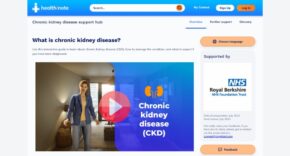
It’s been an exciting period for the healthcare industry, with approvals of effective vaccines offering tangible hope of a return to normality.
But the eventual arrival of immunity won’t mean that we can consign COVID-19 to the history books just yet. One longer lasting impact of the pandemic will be its profound impact on mental health.
The distress, anxiety and depression are challenges that no vaccine can eliminate. Everything from the fear of infection, to losing loved ones, or spending more time alone and the draining exhaustion of uncertainty will continue to pose challenges after the pandemic is beaten. Students of previous pandemics will know that the mental health burden often lags years behind the infectious disease.
Each day we find out more about the mental health effects of the pandemic. Early on, the Office for National Statistics found that one in five Britons reported symptoms of depression, compared with one in ten before. In November, Oxford University revealed that one fifth of COVID-19 survivors in the USA were diagnosed with anxiety, depression or insomnia for the first time in the months following infection. For context, this is twice as likely as patient groups who did not have the virus over the same period.
It’s not too late to avert the impact of this crisis on our mental health. In one sense, we must be thankful that the pandemic has exposed the urgent need to increase spending. I welcome the government’s £500m investment in mental health as part of the 2020 comprehensive spending review.
Having worked as a doctor in NHS psychiatry services it’s clear that the solution to addressing this scale of the challenge must involve technology. Provided such solutions are evidence-based and effective, this is the only way for us to provide the level of supply that begins to meet the widespread demand for support. Put simply, we don’t have enough clinical staff to go around.
With one billion people living with a mental disorder, personalised, digital mental health solutions are society’s best tool for reaching the masses needing help. It’s estimated that 57% of people with a mental illness do not receive any treatment at all, and that by 2025 demand for services could exceed supply by up to 15,600 psychiatrists. Evidence-based, ethical and personalised digital solutions therefore provide the clearest path forward given their scalability, and this is where greater investment should be directed. The recent WISH report on mental health suggested practical steps for doing this.
In general, I am encouraged by the uptake of digital health solutions throughout the pandemic. Over 1.25 million people requested for their prescription to be sent electronically in March, while registrations to use the NHS App increased by 111%. These figures add to the evidence that the move to the digital health era is accelerating.
But there is a way to go. Digital mental health solutions, and the companies that provide them, must overcome hurdles. This includes proving they can handle data ethically and responsibly, as well as demonstrating they fit the needs of the individual user. At present, many apps on the market take a one-size-fits-all approach, and don’t take advantage of technology’s unique ability to adapt to peoples’ symptoms and personal preferences.
Digital solutions must also work harder to prove their efficacy. At present, only 2% of apps have study data. On ORCHA, the organisation that NHS Digital uses to evaluate apps, only 15% of those evaluated meet the minimum criteria for data privacy, clinical assurance and user experience. These stats are disappointing, and hinder the progress of health tech. By proving the merits of digital health, the more likely healthcare providers, employers and insurers will be to distribute the solutions.
The mental health impacts of the pandemic will soon overshadow the direct impacts of COVID-19. As a healthtech industry, if we want to do our part to avert the worst of the mental healthcare crisis and move mental healthcare towards a new era of effective and personalised care, we must take steps now to prove efficacy, deliver personalisation, and meet the highest standards of data ethics.
By Oliver Harrison, CEO, Koa Health












